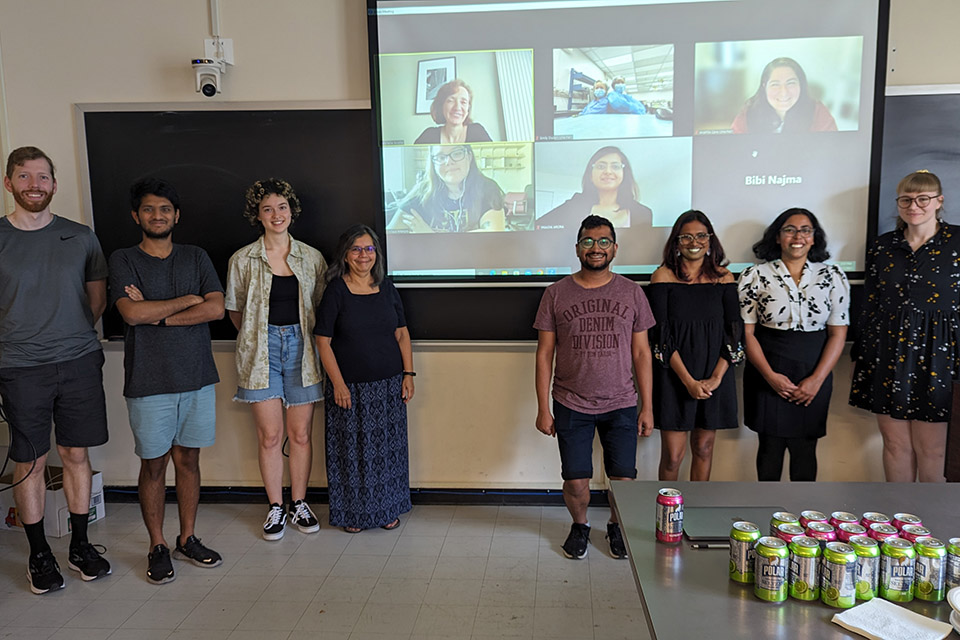Physics Students Launch Women in Physics Group With Aid of Grant

Photo Credit: Anthony Trubiano
August 7, 2023
Abigail Arnold | Graduate School of Arts and Sciences
When Kanaya Malakar learned about the American Physical Society’s (APS) initiative to improve the situation of women in physics, she knew she wanted to become involved. The organization gives around twenty grants a year to universities to start Women in Physics groups and help with the issue of women’s underrepresentation in the field; on October 31, 2022, Malakar’s advisor, Professor Bulbul Chakraborty, forwarded her an email inviting grant proposals from students. “That is when I started thinking about this,” said Malakar. “I am a woman in Physics, I have been in the field for about 10 years, I know the hardships women face, and I thought this was an opportunity to do something.” She had just come back from visiting her home in India, which gave her additional inspiration: “As a child I was raised by very strong women who taught me to hold my head high in the face of challenges. My visit to India reignited those moral values in me and gave me the determination to move towards making a change.”
From the beginning, writing the grant proposal and launching the group was a team effort. Malakar co-wrote the grant with Gess Kelly, PhD ‘23 in Physics, and they leaned on the department’s faculty for support as well. Professor Hannah Yevick agreed to be the group’s faculty advisor, and Professor Aparna Baskaran also provided significant advice. “I was basically talking with these people and trying to get an idea of how to write a grant because I’d never written a grant before,” said Malakar. While she was initially not very confident in the proposal, she ultimately submitted it and heard from the APS in March 2023 that it had been selected.
Malakar, who is now a fifth-year PhD student in Physics, has spent the time since working on setting up the group and reaching out to others to get them involved. She said, “When I wrote to everyone in the department, the response was quite overwhelming. A lot of professors wrote back and offered support –congratulated us and wanted to be involved.” While the grant itself is for one year, Professor Gabriella Sciolla offered to match it and continue it in the following year out of her own funds. Malakar has also been talking to other students and noted that they were “very enthusiastic, so I’m quite positive about this.” She hopes to have a total of twenty to twenty-five people involved in the group, including graduate students, undergraduates, faculty, post-docs, and staff.
While the Women in Physics group is very new, they already have a wide range of plans. They plan to hold regular coffee and cookies socials in the department for people to share their experiences in the field; the first of these socials occurred in July. They also talked to the Materials Research Science and Engineering Center, which regularly does outreach to Waltham High School students; the group will hold a panel discussion for high school students in the upcoming academic year. They also plan to do joint programming with the University of Massachusetts - Amherst’s Women in Physics group and to work with the Brandeis Physics department’s peer mentoring group, which Kelly started.
Malakar is very excited about the possibilities this new group creates. Asked what she has gained from the experience so far, she said, “First of all, the excitement of it – that I wrote a grant proposal and it got accepted. That is quite amazing in itself. Second, the doors it opened – that now we have a community for women and other underrepresented people to come together and share their experiences and be themselves.” She wants people to know that minority groups in a field “can have our own voices. It’s not always easy for someone from a minority group to do this.”
Malakar observed that it is always a good idea to have an open mind and think about issues of diversity in one’s academic field. To those who are looking at applying to similar grants, she said, “Go for it! Now we have laid the foundation for the formation of this whole group, which I hope will benefit the community.” Through taking initiative, collaborating with others, and engaging with issues in their field, the students who launched Brandeis’s first Women in Physics group are taking steps to improve the field for themselves and for others in the future.






